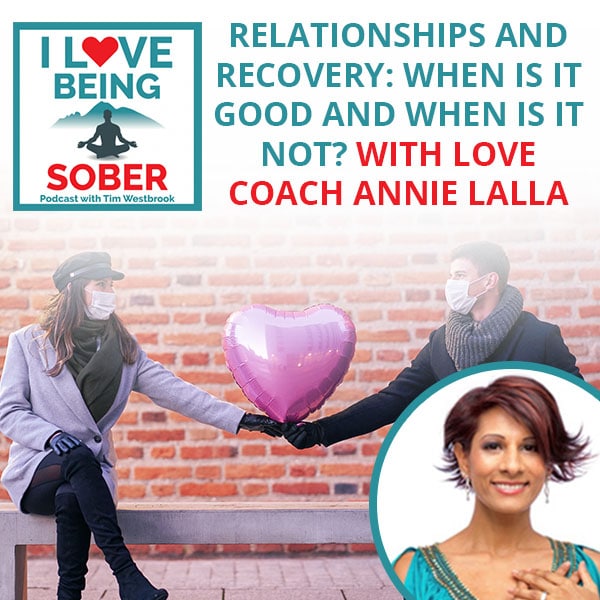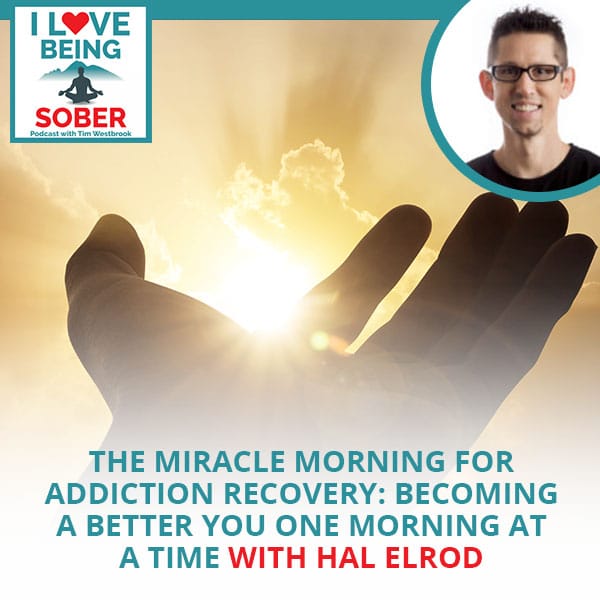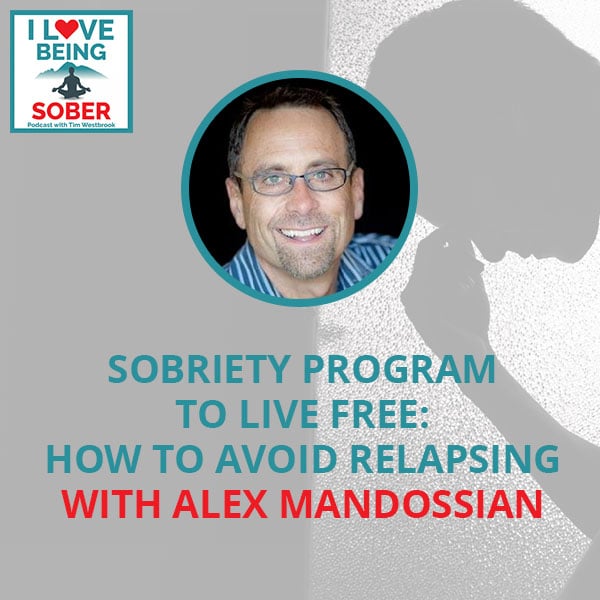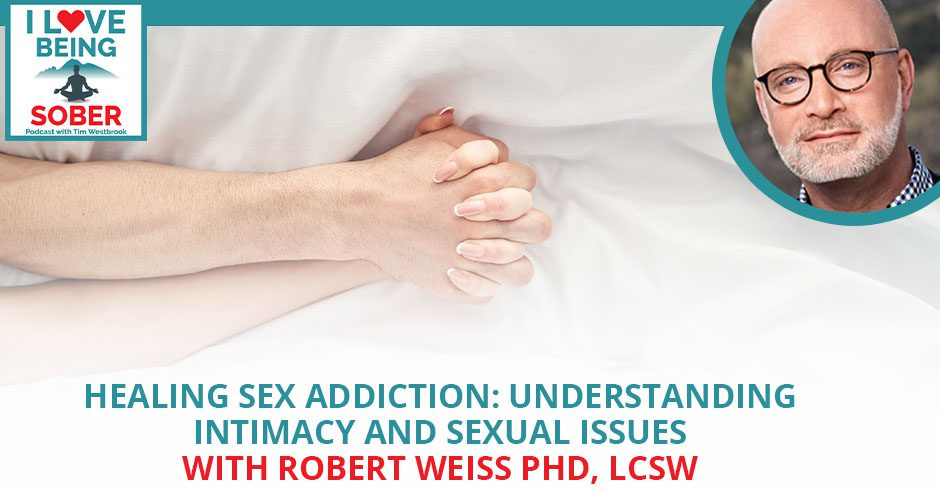
Addiction is a problem faced by many people, and sex addiction is a common one. In this episode, we talk about sex addiction and how to heal and recover from it. Tim Westbrook interviews Robert Weiss PhD, LCSW. He is the Chief Clinical Officer of Seeking Integrity, a unified group of online and real-world communities helping people to heal from intimacy disorders like compulsive sexual behavior and related drug abuse. Dr. Weiss discusses healing sex addiction and other sexual issues and differentiates it to love addiction. He then talks about the path to recovery and why intimacy is important in healing.
—
Watch the episode here:
Listen to the podcast here:
Healing Sex Addiction: Understanding Intimacy And Sexual Issues With Robert Weiss PhD, LCSW
Welcome back to another episode. My team and I over the course of many years have helped thousands of people on their path to recovery. We started this show because there’s so much misinformation about addiction, treatment, mental illness, and recovery in general. There’s so much more to recovery than going to inpatient treatment, seeing a therapist and going to twelve-step meetings. All of those things are important and AA saved my life. However, define long-term recovery and live happy, joyous, and free, there’s a lot more to it than stopping the drinking, the drugs, the sex addiction, or any addictive behavior for that matter. To live a new life, a person needs new healthy lifestyle habits amongst other things.
Typically, this includes new eating, exercise, sleeping habits, hobbies, interests, friends, self-care becomes a priority, and the list goes on. Those are some of the types of things that we talk about here on this show. Now I’m here with Dr. Robert Weiss, PhD, LCSW. He is the Chief Clinical Officer of Seeking Integrity, a unified group of online and real-world communities helping people to heal from intimacy disorders like compulsive sexual behavior and related drug abuse.
He’s the author of ten books on sexuality, technology, and intimate relationships, including Sex Addiction 101, Out of the Doghouse and Prodependence. His Sex, Love, and Addiction podcast is in the top ten US addiction health podcasts. He also hosts a no-cost weekly sex and intimacy Q and A on Seeking Integrity self-help website, SexAndRelationshipHealing.com. The Sex and Relationship Healing website provides free information for addicts, partners of addicts, and therapists dealing with sex and porn addiction, and substance abuse issues. Dr. Weiss and I will talk about sex and love addiction. Dr. Weiss, welcome to the show. I’m so glad to have you here.
Thank you, sir. I’m glad to be here. Thanks for reading that whole list of stuff that I’ve been doing. It makes me feel important.
You’ve got lots of stuff going on. I’ve done research on you. You and I met in person back in 2017 briefly. I’m excited to have you here. We’ll start by diving into it. What is an LCSW?
I’m a Clinical Social Worker. I was licensed. There are various forms of therapy licenses and social worker is one of them. I was licensed back in ‘94 or something. I’ve been licensed many years, but it is a licensure to practice psychotherapy.
You are an expert on sex and intimacy disorders. You’ve been in it for many years. What specific incident inspired you to be so passionate about sex addiction and intimacy disorders?
Tim, anybody who knows me knows I’m passionate about anything that I get involved with. Maybe part of being an addict is I’m driven and focused. I used to be on the bad stuff. Now it’s on good stuff. I went through my recovery from sex addiction. I am still a recovering sex addict. I entered the program on 1985, December 10th. Related to that, I went and got my license in early ’96 when I got started.
[bctt tweet=”The pain of addiction is worse than the pain of recovery.” username=””]What made me enter their field, to be honest with you, was HIV AIDS because, in my addiction, I had sex with enough people to populate China. I didn’t get HIV AIDS during the period when everyone else was. I thought, “We have a bit of a spiritual awakening. Maybe I’m here for some reason.” I knew there were people who were getting caught up in sexual behavior because of addiction that was ending up with them dying of HIV AIDS. I wanted to help them because I had been able to stop my behavior. I wanted to help other people stop theirs. That’s how I got here.
Why do you think you were able to stop?
Any person who wants to stop an addiction doesn’t stop because they want to not do what they’re doing. I wanted to stop because there was something I wanted more. On one side we say, “The pain of addiction is worse than the pain of recovery you recover.” For me also, it was like when I can see people getting things that I would like to have that are healthy in life and I can’t get them because of my addiction, then that may be address it. What I wanted was a loving, healthy, committed home and relationship. I wasn’t going to have that as an act of sex addict.
That brings up a good point, which is in my experience, is people that are focused on stopping. If you’re focused on stopping the drinking, the drugs, and the sexual compulsivity, it doesn’t work. If you’re focused on the new life and what you want, that’s when it works.
It’s the same for recovery. In the early stages, I don’t tell people, “Recovery is not about what you don’t do.” It’s good to not drink, use, and gamble depending on your addiction, but recovery is much more about what you do. Where do you take yourself? What do you do to get your support? How do you engage with other people? This is recovery and how do you enjoy your life? That is what recovery is about. I don’t want to recover to sit at home and bake bread.
It’s living the life of your dreams. I was one of them. I couldn’t imagine living life and having fun not drinking, doing drugs, and not acting out. I’ve learned and I know that you’ve learned it as well. Life is amazing on the other side of it once you get past it.
In a different way, life is amazing and a drip of good things and bad things. Not having everything all at once when I was an addict. I wanted it all to be amazing. What a friend of mine said is that, “A life well lived in recovery is one notch above boring.” That’s right. That’s how life should be. A few highs, lows, but generally stable and consistent, and that’s not how I lived as an addict at all.
What is the definition of sex addiction?

Sex Addiction: Any person who wants to stop an addiction doesn’t stop because they want to not do what they’re doing.
The definition applies to any addiction, which is a behavior that I’m engaging in, with or without a substance that is significantly affecting the functioning of my life. Despite the fact that it is hurting my family, work, whatever it is that it’s destroying my health, I continue to do it. I continue to obsess about it. Most people make a mistake and they learn and don’t do something again. Addicts make mistakes. We think, “That felt good. I won’t look at the bad part. I’ll do the good part over and over again.” Unfortunately, their families and marriages fail. That’s addiction. Your life fails as a result of it, in my mind.
In sex addiction, what I see is people are losing their relationships, especially marriages in particular, I see a lot of marriages get destroyed. I see people looking at porn in the workplace, they get fired. I see people caught up in prostitution stings. When sexual behavior or relationship with porn is causing significantly negative problems in life and if the behavior doesn’t change, it’s an addiction like any other addiction.
There are a lot of people out there that they look at porn. It’s like, “What’s the problem with looking at porn?”
I don’t think it’s a problem. Lots of people look at porn. I don’t have a problem with people drinking. Having a glass of wine or even getting drunk, and either is fine. If you have certain emotional vulnerabilities, then you’re not going to be able to do casual, pleasurable things in the same way as healthy people. Addicts grab onto intensely arousing, distracting, stimulating behaviors for different reasons than healthy people do. I turned to compulsive sexual behavior, not to have a good time having sex, but to escape a difficult emotional life. Addiction often has a secondary gain, which is other people drink to be social and alcoholic drinks to feel okay. That’s a big difference.
It’s the solution. You have the sex addiction and the love addiction. What’s the difference between sex and love addiction?
Love addiction is a graduate school for sex addicts. Sex addicts, we objectify body parts. When we can have access to those body parts, it empowers us. We feel important and so if I can get that great butt or those amazing arms or that beautiful face to be with me and have sex with me, then I’m important and special and worthwhile. Somehow, we validate ourselves in a way that’s empty through that kind of behavior.
Love addiction is more using people. The whole person is an object to fill the emptiness and loneliness inside of you. You fit that person into you to make yourself feel better, but for love addicts, it isn’t as important who they are. It’s more important that they fill the emptiness in them. When you are with that person a few months and then you realize, “That’s not who I thought they were. They’re not filling this emptiness inside of me.”
You tend to rage at them or leave with them or move on to someone else because you’re not interested in that person. You’re interested in what they do for you. That’s love addiction. I’ve heard some people talk about sex and love addiction. They only have one person that they’ve had an affair with. It’s not like they’re having multiple affairs with multiple people. They’re having one affair with one person.
[bctt tweet=”A life well lived in recovery is just one notch above boring.” username=””]It seems like a problem to me. It seems obvious to me, but can you answer that?
First of all, the question is, is that an addiction? I can’t tell you. Lots of people have affairs. What I call an affair is immature. What I called people in committed relationships, who go out and have sex and hang out with other people romantically is immature because they don’t keep their partner in mind when they go out in the world. They’re all on their own, like some little kid in a candy store and they’re not thinking, “I shouldn’t be eating all this.”
Specifically, I’m thinking of one person and that person was married. They had one pertinent person that they had a relationship with for three years.
The question is, are they sex addicts? The person had an affair. My clients don’t have an affair. They have five affairs. They’re seeing sex workers at the same time. They’re playing with porn every night. For example, I’ve had a lot of men that I work with say, “My big problem is I don’t know which one to pick. Is it the lover? Is it the spouse? I can’t decide.” I’m like, “How about being alone for a while?” That might be the best solution of all, but repetitively using body parts, situations with people as a means to fill yourself and make yourself feel better, that may not happen with someone who has an affair. For example, I might have a wonderful relationship and being completely monogamous.
My spouse has a child and we have a child. All the attention goes to that child. I find this person who’s not heavy and didn’t have a child. I don’t mean heavy, but you gain weight when you’re pregnant. Someone who does want to have sex with me, who’s looking great, who isn’t focused, all of a sudden, I’m getting all this stuff for myself from this other person that I feel I’m not getting in a relationship. Maybe when I’ve got a kid who’s 3 or 4, I returned back to my relationship.
My spouse finds out about the affair and I stop and I don’t enter one again. That’s someone who, for whatever reasons, was vulnerable to leaving their relationship because they’re needy. They weren’t getting what they wanted when they had a baby. They turn to something else to get some needs met. That’s different than someone who’s a sex addict. That’s someone who had an affair.
Would you say that’s more along the lines of codependency?
I don’t believe in codependency. I don’t think it exists. It’s an incredibly pejorative, negative form of, I don’t know, whatever it is. It’s not real therapy that needs to be eliminated. I wrote a book called Prodependence because people who love addicts should not be picked apart when they walk into treatment. They shouldn’t be asked what’s wrong with them and what their childhood is. People who finally get that love, love an addict, and get them into treatment, we should celebrate them and say, “What a great job you did hanging out with that person. How amazing was you stuck by them? How difficult they were and how great love is.” Partners, spouses, and family members need to be validated for having done everything to hang out with that addict.

Sex Addiction: If you have certain emotional vulnerabilities, then you’re not going to be able to do casual, pleasurable things in the same way as healthy people. Addicts grab onto intensely arousing, distracting, stimulating behaviors for different reasons than how others do.
The idea of evaluating the mental health or psychological health of a partner, a spouse of an addict, because they’re with a partner or spouse of an addict is cruel at best. At worst, it follows what addicts have always done, which blame their spouses. Everyone blames their spouses, “If she wasn’t this and he wasn’t that, then I wouldn’t drink, I wouldn’t this.” No, you’re going to drink if you wanted to drink. Codependency gave a lot of excuse to say, “If my partner wasn’t so codependent, I wouldn’t keep running.” You drink because you want to. We’ve always blamed spouses in a whole variety of ways over the years. I’ve opened up a completely different avenue or 180-degree turn on codependency and there isn’t going to be any going back, I don’t think.
I’ve seen many alcoholics and drug addicts. I’ve seen them move from substances over to sex addiction, porn addiction, SugarDaddy.com. I’m in an AA meeting and I see these men. It seems like their addiction has moved. Do you see that often?
I can’t judge what any individual is doing, but I do know addiction is a game of whack-a-mole. You hit the food thing and then someone starts gambling and you hit the gambling thing and then they’re getting high every day. Addiction as we know it is the part that shows over the water. It’s the tip of the iceberg. What’s underneath, the unhappiness, the trauma, and the issues that are there, they can drive any addiction. It doesn’t, to me, matter as much about the addiction is what’s going on underneath, even though we need to stop the addiction.
How can a person address it?
There’s no question in my mind. I stand behind that, unless you deal with substances, you can’t deal with anything else because drugs and alcohol are disinhibiting. I say, “I won’t eat. I won’t whatever.” I have a couple drinks and all the bets are off. You have to deal with substances first unless the behaviors are so problematic that you need to deal with both. I run a treatment center called Seeking Integrity. One of the things I wanted to do there was treat people with dual addictions, drugs and sex.
I see a lot of people go to drug and alcohol treatment but they have a lot of sexual issues with sexual acting out. No one mentioned sex. They’re so focused on the drug piece. The person didn’t bring it up. You don’t bring up sex in a group of alcoholics when you’re in treatment. It never gets dealt with, and their abuse or their incest or whatever happened to them, never gets talked about. They end up using again over unresolved issues. My particular interest is in these combined issues of meth-sex, alcohol-sex, opioid-sex because I know they’re not going to stop the drugs until they do with the sex at the same time. That’s how I look at it.
How often is it that you see someone that is in treatment for substance addiction also has sex addiction?
It’s 20% of the time, something like that. Maybe a different question would be how many people go in for one thing and then find out they have other things? How many people go in for alcohol and then find out they also have a spending problem? How many people go into drugs and alcohol, and then realize they’re working 80 hours a week and they’re workaholic. I don’t think it’s unusual at all to have people go into treatment and then to discover other dysfunctional parts of their lives.
[bctt tweet=”Love addiction is graduate school for sex addicts.” username=””]When people go into treatment, and you know this, they go in for the problem like, “My drinking is the problem.” They don’t necessarily think. This is why treatment centers need to broaden their view. They’re in there for alcohol. Nobody’s thinking about gambling and spending. They don’t get those in it. Anyway, it needs a specific focus unless these things are shared.
I’ve heard you say that before where it needs to be part of the intake process or there needs to be something that happens in a treatment center for substances. Part of the process needs to be, “Let’s talk about your other issues,” or some sort of a questionnaire. How does that happen?
If you’re not a sex addiction program, why can’t there be a men’s group twice a week or a women’s group twice a week in the evening where they talk about those kinds of intimacy issues? I could work in a drug and alcohol center and say, “Monday night, we’re going to talk about miscarriages and abortion,” and the women, that’s their topic. With the men, we can talk about having sex when you felt insecure and using a woman when you thought it was consensual, but it wasn’t.
We can set those topics. We can have those conversations. When we do, the person with the issue stands out like, “They sound a little different than the other people when we’re talking about sex or those things.” I believe you have to give people space. We are built to heal. If you and I create a space for people to heal, they will.
If a person gets clean and sober from drugs and alcohol but they have this other addiction, say sex addiction, that has not been addressed, are they more or less likely to relapse back on their drug of choice eventually?
If they are tied together, for example, the person who has a cocaine problem. They’ve worked on it and stopped using the cocaine. When they did cocaine, they were seeing sex workers. They were hiring people to have sex with and that’s where they got the drugs. When they go out in the world and they’ve gotten sober on coke, when they go back to have sex with those sex workers, guess where the drugs are? They’re going to end up relapsing over behavior that had nothing to do with their drug and alcohol treatment, but there it is in front of them. Sex and dating apps are rife with people who are looking to do drugs and have sex.
Many years ago, in order for a person to find a sex worker or porn or anything like that, it was a much bigger ordeal whereas now, it’s open up your iPhone.
We have these three A’s of things that lead people to addiction on the internet. They are, to say them, Accessibility, which we didn’t have in the past. If I wanted an adult magazine, I had to get in my car and go to a bookstore, whatever it was. Anonymity because I’m there on my phone and you don’t know what I’m looking at. Affordability, because porn and all that used to be expensive. Now, even sex workers, to be honest, you can go online and find them for $1.99 a minute.

Sex Addiction: Addiction is just the part that shows over the water. It’s the tip of the iceberg. What’s underneath is the unhappiness, the trauma, the issues that are there.
It’s a whole different ball game in terms of accessibility, affordability, anonymity, and that seems to be what drives online addiction. To put in a little plug, Intervention, the television show on A&E is going to be doing a brand new series called Digital Intervention. They’re going to look at gaming, gambling, spending, porn and all of that and see the addictive relationships that people have with those behaviors.
When does that come out?
The first episode that they invited me to do is the porn and sex piece, which I’m excited about. I’m excited because I want people to be educated. If I can help people see that someone with an addictive sexual problem has a problem and they’re broken rather than they’re sick perverts, then I’ve done my job. Digital Intervention either air in the fall or in early winter, like January or February 2021. I’m in Hollywood.
Which is where you’re located, or somewhere in LA?
I’m in Santa Monica.
Where is Seeking Integrity located?
Seeking Integrity is here in Los Angeles. We started a few years ago. It’s a very small program, not particularly expensive. I am treating men with intimacy disorders, but in a therapeutic way, what we are talking about is attachment disorders. These men that I work with never felt safe enough to trust intimacy, but they sure trust having affairs, picking people up, looking at porn, all of that controllable behavior is what they do.
You mentioned the other piece, which I do want to mention. It’s not a plug for anything. I’ve worked hard to create venues where people get help for free. We don’t talk about this a lot, but a lot of people are never going to get to a treatment center. They have the money. A lot of people are never going to see therapists. In fact, more people in trouble never get to treatment and therapy because they can’t afford it, time, money, whatever that is.
[bctt tweet=”Partners, spouses, and family members need to be validated for having done everything to hang out with that addict. ” username=””]What I’m interested in, especially with the internet, is how can we build communities of supportive people where, for example, in our world, women who’ve been betrayed by male and female sex addicts can meet, couples that have been dealing with betrayal. Not specifically twelve-step, but I’m very interested in communities being developed. I’ve developed one for sex and porn. I would love to see some expert develop an eating disorder site and a drug and alcohol site where experts can answer questions and you can get engaged and support a little bit more sophisticated than twelve-step.
In other words, we have a lot of ways of reaching people. Maybe you don’t have the resources. I had a podcast. We have almost a million downloads, about 850,000 called Sex, Love, and Addiction. It’s free. I’m interested in people getting free resources. That excites me. This is a free resource. Thank you for doing it.
Thank you for being a guest. I’ve seen many men in recovery from sex addiction because they got caught having an affair. They don’t believe they have a problem. Do you see this where people are in treatment because they got caught having an affair, doing something, don’t want to get divorced, and that’s the only reason they’re in treatment?
I have been treating male and female sex addicts for many years. I have probably seen 800 to 1,000 people with this problem. Let’s say I’ve seen 800, 100 females and 700 men. If it was 800, 780 of them came because they were in trouble and over 25 years came because they wanted to be better people. People go to treatment because they’re in trouble. It’s funny when the media says, like, “They just went as an excuse.” They went to get out trouble. I feel sorry for them, but who cares?
My interest is in what happens when they’re in treatment, not what motivates them to go. Generally, what motivates heterosexual men to go is there going to be a wife has had it and she’s not going to take any more. It’s not one thing. It’s affairs, porn, and finding things out over years. By the way, this speaks to the financial issue. If you’re a woman who doesn’t have the resources to leave that man, if you need the money and him around to pay the rent, you’re going to have to put up with it.
Not all sex addicts are male, but nonetheless majority, if a woman doesn’t have the resources to say, “I’m divorcing you or I’m leaving you,” then she’s going to be stuck with it, which is painful and difficult. I wanted to go back to a question you answered that I remembered. You are asking about addicts going into an AA meeting. You were saying how some of them will start flirting with people and are they turning to another addiction is what you were talking about.
Do you see addicts, alcoholics, substance abuse addicts move from the substance over to sex addiction?
First of all, most sex addicts who are substance abusers will say that they had problems with intimacy and sex long before they ever had a drinking or alcohol problem. They realized that when they stopped drinking and using that those issues preexisted before the drinking and the drugs. In other words, I knew I had issues with sexual stuff and compulsivity related to porn when I was fourteen, but I didn’t start drinking until I was nineteen.

Sex Addiction: The internet is a whole different ball game in terms of accessibility, affordability, and anonymity for addicts.
The other thing is people who stopped drinking and using is hungry to escape and find an emotionally intense, distracting experience. Do you know how many addicts in their treatment not smoking and leave treatment smoking? Not treatment but certainly go to meetings, all of a sudden, they’re smoking, eating donuts, drinking Coke and hitting on people.
It’s like, “Whatever I can put in me to escape in the way that I used to escape emotionally with drugs and alcohol, I’m going to find.” You and I know also that sometimes people will do a lot of that picking up thirteen-step or whatever you want to call it in their first year. Once they’ve calmed down and more focused, they will stop all that other crazy behavior. Some people have found they have another addiction.
You were talking about intimacy. I have a question on that. A lot of people think that intimacy and sex is the same thing. Before I got clean and sober, I didn’t have intimate relationships. The first real intimate relationship I ever had was with my sponsor. That was when I learned intimacy and it’s not sex. Let me hear you.
It happened. Intimacy has to do with a connection to other people that may or may not involve sex. Sexual intimacy is one form of intimacy, but it’s not the only one. There are a lot more that are just as meaningful. Intimacy is the experience of making yourself vulnerable and being known. Do you mind if I tell a little teeny story? I went to the doctor. I had an elbow problem. I’ve never met the doctor before. He knows I’m a sexologist and a therapist.
He said, “Do you mind if I ask you a question,” while he was working on my elbow. I was like, “Go ahead.” He said, “I’m 60 and my wife’s 45. I’m worried about performance. Do you have any thoughts?” He knew what I did for a living. He wasn’t trying to use me or take advantage of me, get all the information. He was asking question. I thought, “I like this guy. I want to go back and see him again.”
The reason was he had made himself vulnerable to me. He had talked about something that was intimate, sexuality with his wife. He turned to me in a very innocent way, asking for support. I felt closer to him because he had made himself vulnerable. This is the opposite of what most people think. In group therapy like, “What if I say this? They’re all going to hate me.” The reality is, if you say something that’s very meaningful about yourself and even something is hard to say, most people will move towards you. That means you’re building intimacy.
Friends create an intimacy by talking about their shared issues and the person I’m intimate with, don’t abandon me and leave me. They support me and learning more about me even if they don’t like what they’re hearing. Sexual intimacy is one form of intimacy. Intimacy is about being known and the willingness to make yourself vulnerable to risk that another person will support you, let you in, and not judge you. You have to take that risk of opening up to that person. That’s where the intimacy starts.
By the way, this is how you learn if someone’s a friend or someone’s a date, because if they respond with, “Let me tell you about me. I don’t agree with those,” if someone doesn’t bring you in when you’re being all intimate, they’re probably not the right person that you’d be friends with. You want that person to respond to you, “Tell me more about that. I’m sorry that happened to me, too.” They are engaged and that’s how intimacy is built.
[bctt tweet=”Unless you deal with substances, you can’t deal with anything else because drugs and alcohol are disinhibiting.” username=””]How can a person learn intimacy?
It’s practice. How do you learn anything? I went to twelve-step meetings because that was a no-cost away for you to walk into a room and practice getting along with people. I mean that because part of what happens in twelve-step meetings is you go out for coffee after, you talk with people. You’re a sponsor. You can become responsible to someone else or someone who sponsors you. You learn how to have a dependent relationship with someone who has authority.
You bring a coffee every week, which means you learn accountability and structure. People think twelve-step programs are about following those steps and going to those meetings. To me, it’s a much more sophisticated social and relationship learning experience. What I love about twelve-step meetings is I can walk up to you and say, “I’d like to be your friend. Screw you. I don’t like you.” I can go onto the next person. In other words, there’s endless numbers of people to practice getting close to and getting to know. Those kinds of environments for addicts who tend to isolate is a good place to practice.
My experience was the same. I learned intimacy in twelve-step meetings. I learned real human connection. I talk about how I moved to Arizona in 2006. From 2006 to 2011, I was in my addiction and I had a bunch of surface level relationships. Once I got clean and sober from 2011 until now, my world has completely opened up because I’ve learned to truly connect with people. That’s at meetings with a sponsor, with sponsees, that’s even with people at the coffee shop. It’s people in passing. Before getting clean and sober, it’s all about Tim.
I wasn’t interested in you because it was about me.
It’s learning to pay attention, be aware, listen, be of service, and be vulnerable.
Some people say, “Do I need to spend my life in meetings?” You might be going for a long period of time on a regular basis, but your life shouldn’t be about that after the first year or so. You should be having those social intimate experiences in recreation, hobbies, or with friends. The goal of recovery is not to go to meetings every day. It’s to get out in the world and practice the lessons that you learn. If I learned to make more friends, be more at peace and be less reactive in a twelve-step meeting, I need to then go out in the world and join a hiking group and start playing tennis with people, getting engaged with people and using those skills in the real world.
That’s been my experience as well. There was a study done and I don’t know where this study was done. The study showed that people that had multiple communities were happier.

Sex Addiction: Intimacy has to do with a connection to other people that may or may not involve sexual intimacy. Sexual intimacy is one form of intimacy, but it’s not the only one.
They live longer, healthier, all of it.
To your point, it’s like yoga, CrossFit, a hiking club, reading club, or a baking club.
I hate to tell you this, but human beings were never meant to live in an apartment on the 38th floor by themselves and not know their neighbors. For all of humanity, we’ve grown up in communities. It’s auntie across the street and grandma who’s upstairs. We thrive in community, but our lifestyle and way of living forces us more into being separate, isolated, and individual, especially in car driving cities.
I feel like in New York, you engage more people than you might in Atlanta, where you’re more driving around. The environments we live in also set us up for that, but addicts actively avoid connection. I’d rather use by myself at home. We also devalue healthy engaged, like, “Who would want to go play softball at my age? I’d rather get high.” We devalue the fun if we even know what fun is.
It’s Dr. Gabor Maté that said, “Addiction is the opposite of human connection.” Do you agree with that?
Yes. I remember I said and you said that we’re dealing with intimacy and attachment disorders. I believe that addicts are desperately seeking either to shut up their loneliness, longing for connection, drink it away or they’re using it as a form of trying to make a connection. Either way, it doesn’t work. Drugs and alcohol, these are substitutes. Sex, for example, I can feel known and important. I’m in bed with this person. We’re all over each other, but they’re a stranger to me. I’ve never met them before. I’ve only known them a short time. I cannot be intimate with that person. I can have sex with them, but they don’t know me. They don’t know who I am. I’m only doing a physical act. I’m not doing an emotionally engaged physical act.
One of the challenges, by the way, for sex addicts is when they put down all of that behavior, the porn, the acting out, the affairs, whatever and they try to be intimate with a real person. The challenge is they know how to do things. They don’t drink, use, or have sex with strangers, but being with real people and being close and intimate, we avoid that. We don’t move toward it. We move away. We don’t get fed by the very thing that we need, which is emotional support, connection.
Relationships are about giving as opposed to taking. That’s what I think about. When someone’s with a sex worker or looking at porn or whatever, they’re taking.
[bctt tweet=”It’s not unusual at all to have people go into treatment and then discover other dysfunctional parts of their lives.” username=””]It’s more like putting yourself in a bubble. You’re in this little world of your creation. It’s controllable. If I see sex workers, rather than being deeply intimate with my spouse, no sex worker is going to let me down. No prostitute is going to abandon me or hurt me. I have complete control over that relationship. I’m paying for it. With a partner, someone I’m close to, they can hurt me. Turning to these more casual, I don’t think I know, porn, sex workers, affairs, intensity, stripper, all that stuff, it’s much easier for us to do that, sex addicts, than be close and vulnerable with someone that we care about. We often set up two lives. We have home, love, and connection over here. We have this crazy sexual behavior here, and it’s all compartmentalized. It’s not connected. We live multiple lives.
It’s believed that once an alcoholic, always an alcoholic. Is that the same thing that’s true of a sex addict?
All the addictions are the same. They all come from the same place. Addictions are longing for connection without the ability to do it or the fear of doing it. By the way, when you go to twelve-step programs, you are forced to connect. Think about it. What do we do with the most mentally ill or addicted when they are home going crazy? We take them out of there. We bring them into community where we put them in a hospital. We take them to meetings and we put them in a group. We bring them to connect with people. We’re literally saying, “This will replace that if you work it, if you engage here, you’ll have less of a need for that.”
What is the meeting do that the alcohol doesn’t do? It connects you. It makes you feel a part of something. We are human. We long for that. Addiction tells us to stay separate and to do it on our own. All the addictions have the common thread of, “I’m fearful of intimacy. I’d rather take care of everything by myself because I don’t trust that other people will help. I’m isolated in my own little box. When my deeper needs come up for connection or support, I don’t turn to the people who’ve been supporting me. I turn into the situations where I feel a sense of control and no one can let me down.”
I want to mention something more about your last question. All addicts have an intimacy and an attachment disorder, which is my belief system. We talked about Gabor Maté talking about that. A lot of people talking about the opposite of addiction is connection. I assume that I have a brain problem. Addicts, many of us who should have grown up with a lot of focus on us, support for us, consistency, and nurturing, we didn’t get that for whatever reason.
I had crazy parents. They were not available to me. Some people have alcoholic parents or parents would fight all the time, whatever their caregivers do, that person does not learn to trust. They do not learn to rely on their caregivers. They learn maybe to reach out for help means, “I’m going to get abandoned.” Later in life, they don’t turn to people for intimate love and support. They turn to something they can control. They can control alcohol, drugs, and gambling. They can completely control in situations, by the way, where you and I would fall out a control. Trolling the street for sex workers would not make me feel safe, but a sex addict feels powerful and great when they’re out there doing that. They’re feeling a sense of control and excitement.
They say that an alcoholic can never go back to drinking like a gentleman. Can a sex addict ever go back to having sex like a regular person?
This is one of the challenges of having an addiction in an area that is a naturally occurring issue. Eating’s a naturally occurring thing and we need to do it. Sex is a naturally occurring experience. I don’t want people to stop having sex. I want them to have healthy sex. When you come to eating food, abstinence is not stopping altogether. You wouldn’t say to someone with an eating disorder, “Stop eating and you’ll be fine the rest of your life.”
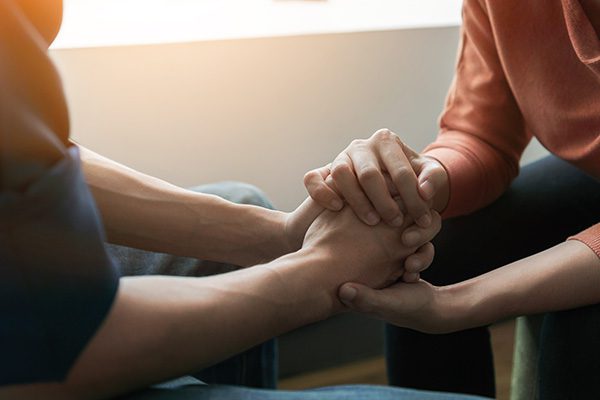
Sex Addiction: The idea of evaluating the mental health or psychological health of a partner of an addict just because they’re with them is cruel at best and, at worst, follows what addicts have always done—blame their spouses.
These are what we call process addictions. They have to deal with behaviors, not drinking and using. You can stop gambling and have a happy life without any fantasy football, casinos, and any stock market. You can stop spending, but sex you want to keep having. Eating you want to keep doing. We create a plan for sobriety, which is we write out what are the unhealthy behaviors that you need to stop, like seeing sex workers, calling exes, patrolling out at night and not having a plan.
Whatever the behaviors, we’re going to set it down. We’re going to establish sobriety, almost always sexual behaviors. I might look at someone a little too long. That’s a warning sign. If I go over to them, start talking to them and get them in bed, bottom line, I might eat a lovely meal, but if I go back for seconds or take a huge dessert, then it’s not. With naturally occurring things, we set boundaries around the problem behavior. We encourage the healthy ones.
I can have sex with my partner, we have a little saying, which I love that sex or sex addicts has to come from willingness, not from horniness with an intimate partner. What that means is as a sex addict, I went out looking for the hottest, most exciting, and then it was intense and I want to do, and you wanted me and heart-pounding. There’s a new bod and there’s a new one. It’s all exciting. When you live with someone for fifteen years, that’s not what sex is.
You’ve seen that butt before, so how do you make intimate sexuality exciting and connected? You don’t do it by saying, “You’re so hot. I can’t wait to get in bed with you.” You have to find other ways. Be willing to find your way into sexual intimacy in ways that you haven’t as a sex addict. That takes working on your fear of intimacy, which most addicts I know have. You can have sex, but not all sex.
It’s learning intimacy and connection, and it’s not the high. That could be a rule of thumb. If you’re chasing the high, you’re going into territory that could be a slippery slope.
It’s more like we’re looking at the behaviors have already caused problems. When I work with someone, I ask them what they want in life. Do they want a family? Do they want their marriage to work? What sexual behaviors are not supporting that? “I’m looking at porn three hours a day. It’s hard to get through school. I’m having sex with strangers, but I want to have sex with a partner.” How do we get you from here to there and not have you go back to the old behaviors?
Is sex addiction genetic?
The capacity and vulnerability for addiction are genetic. What I mean by that is some people come out of the womb and they’re calm. They don’t make a lot of noise when they’re babies. Their parents love them and fairly common patient people. That’s how they came out of the womb. That’s their genetic piece. Other people come out anxious, more fearful, and less connected. People are all different and we’re all different at the moment of birth all the way through. The person who had a depressed mother might have genetic issues, issues going through their family, like uncle was an alcoholic. When you’re going to see those genetic predispositions, you’re going to see a predisposed predisposition toward either psychological disorders or addiction or both.
Is there a question that you’ve always wanted to be asked, but the interviewer never got around to it?
[bctt tweet=”People who just stopped drinking and using are hungry to escape. They are hungry to find an emotionally intense, distracting experience. ” username=””]One of them is, can women be sex addicts? We often talk about men, but we don’t talk about women.
Can women be sex addicts?
Yes. I opened one of the first treatment centers just for women with these issues. Interestingly, by the way, women will often bounce back and forth between food and sex. They’ll gain a whole bunch of weight when they’re in a relationship, literally push a person away. When they’re single, they’ll lose all the weight and run out there, and pick whatever they can find, and back and forth. I see everything from very compulsive behavior repetitively with strangers in women, which we see in men more often all the way to affair after affair, but I’m also sleeping with sex workers. You don’t see as many. We don’t see as many women getting in trouble for sexual problems as we do in men. There is a good reason for that.
What’s the reason?
I knew you were going to ask that, testosterone. We are much more highly sexual, aggressive, competitive, and physical in those ways because we have testosterone and women don’t. Why are 90% of the people with sexual problems rape offending in prison who are male? Women don’t have testosterone. They’re not driven in the same ways as men are around sexuality. Why don’t we have a huge #MeToo Movement for men?
We have a small one because men are aggressive and we are more of the aggressors. We are programmed that way and then the chemicals. Do you ever noticed how a 65-year-old man, most of them, are a little bit less apt to go, “It’s you baby going down the street?” That’s not just aging. That’s the hormonal situation has changed and I’m not so driven to look, touch, and talk to that. It’s not that important to me in the same way it did when I was 23.
My experience is that women are more likely to have eating disorders and men are more likely to have sex addiction. Why do you think men are less likely to have an eating disorder?
This is not research-based, it’s just how I would put it, men tend to act out. Men act out with sexual behavior, violence, stealing, and outside of what’s healthy for them out there in the world. Women tend to more act in, so they get depressed. They stopped being functional. They eat and do things that make their life more insular, not so much habit. Women more tend to have problems here. Men tend to have problems out there.
[bctt tweet=”Intimacy is the experience of making yourself vulnerable and being known.” username=””]Not that it can’t be different, but women are soothing themselves and regulating their mood with food. They’re not rushing out there for intensity with sex for the most part. That simply has to do with how we’re built as men and women. Women are out there struggling. Especially with porn, I don’t know if you know this, I have been running a support group for many years. I do it as service online, volunteer.
For years, I have seen 50% of the people in that group, women. Now I go to a twelve-step meeting for sex addicts, it’s 90% men. When you go online, you find that women feel safer in community online. Women don’t necessarily want to go to a church basement on a rainy night and sit with nine guys who have sex problems, but they go online and I find a lot of women. We are going to see all kinds of addicts showing up for help because they don’t have to walk into a church basement at 9:00 at night. The internet has offered women a lot more opportunities to heal than they have before, in my opinion.
There’s a treatment center in Tucson. They have a program called Intimacy Disorders. It’s used to be Sex Addiction, but now it’s Intimacy Disorders. My understanding is that women felt safer once it was called an Intimacy Disorder.
Think about this, if I’m a guy and I’m having a lot of sex, and I don’t tell people about the bad parts, I tell people about sex I’m having, I’m going to be called a stud. People are like, “That guy’s cool. He gets laid all the time.” If I’m a woman and I’m out there had a lot of sex, I’m going to be called a slut or a whore. Women already intuitively know what people think about them if they’re out there having a lot of sex. It’s much harder for a woman to come out and talk about it because she’s not going to be the player, she’s going to be the bad girl. Our culture already knows that and acknowledges that and accepts. There is an important reason why we look at women and men differently or have these issues, for sure.
I know you already mentioned this. How can people find support if they are struggling or if a loved one is struggling with sex addiction?
There are endless support groups online. Sex and Relationship Healing is one of them, but every twelve-step program is online, Sex and Love Addicts Anonymous. There are programs for people with porn problems or Sex and Porn Addicts Anonymous and Porn Addicts Anonymous. There’s all of that. I wanted to say something else about porn. Let’s go back to your question.
Educate yourself. It’s true that there’s a lot of fake news online, but if you look for experts, and this is where you need to look, look for the person who has the PhD, who has the educational customers, the drug and alcohol counselor, and the people who know what they’re doing and read and learn. Also, YouTube is a great place to have professionals talk to you and learn from you and all that stuff. We offer online courses where people can learn how to work on this stuff. The internet now, there are so many opportunities. There are whole communities for men with porn problems, with thousands of people going every week trying to change their behaviors.
The gift of the internet, in part, is that there are so many places you can go and learn. It’s funny. I want to say this silly little thing, and it’s so silly, but you and I often recommend a book for someone to read. This would be helpful if you read this book, Addicts and Partners. I was talking to someone and I realized, “I can tell them to get it right this minute.” By the time we’re done with this conversation, they’ll have the book in their hand. Little things like that have changed my world in ways that help people. I’m a huge fan of accessing things online. Education is the best way to start.
[bctt tweet=”Addictions are longing for connection without the ability to do it, or the fear of doing it.” username=””]Where can people find you? How can they find you?
I’m not hard to find. If you type in Dr. Rob Weiss and sex, you don’t need to go much further than that. If you want to write me a note, I’m Rob@SeekingIntegrity.com. The podcast is SexAndRelationshipHealing.com. The treatment center is Seeking Integrity and our free website for support is SexAndRelationshipHealing.com. There are lots of ways to find me. You will find me on Digital Intervention. I’m excited about that. For parents out there who have kids who are struggling with social media and the internet, Digital Intervention is going to be very helpful.
Dr. Rob, thank you so much for being on the show. I appreciate you. I learned a lot. I hope our readers learned a lot as well.
I love being sober. Thank you for naming it that. Thank you for inviting me in.
Important Links:
- Seeking Integrity
- Sex Addiction 101
- Out of the Doghouse
- Prodependence
- Sex, Love, and Addiction – Apple Podcasts
- SexAndRelationshipHealing.com
- SugarDaddy.com
- Sex and Love Addicts Anonymous
- Sex and Porn Addicts Anonymous
- Porn Addicts Anonymous
About Robert Weiss Ph.D., LCSW
 Robert Weiss Ph.D., LCSW is Chief Clinical Officer of Seeking Integrity LLC, a unified group of online and real-world communities helping people to heal from intimacy disorders like compulsive sexual behavior and related drug abuse. As Chief Clinical Officer, Dr. Rob led the development and implementation of Seeking Integrity’s residential treatment programming and serves as an integral part of the treatment team.
Robert Weiss Ph.D., LCSW is Chief Clinical Officer of Seeking Integrity LLC, a unified group of online and real-world communities helping people to heal from intimacy disorders like compulsive sexual behavior and related drug abuse. As Chief Clinical Officer, Dr. Rob led the development and implementation of Seeking Integrity’s residential treatment programming and serves as an integral part of the treatment team.
He is the author of ten books on sexuality, technology, and intimate relationships, including Sex Addiction 101, Out of the Doghouse, and Prodependence. His Sex, Love, and Addiction Podcast is currently in the Top 10 of US Addiction-Health Podcasts. Dr. Rob hosts a no-cost weekly Sex and Intimacy Q&A on Seeking Integrity’s self-help website, SexandRelationshipHealing.com (@SexandHealing). The Sex and Relationship Healing website provides free information for addicts, partners of addicts, and therapists dealing with sex addiction, porn addiction, and substance abuse issues.
Dr. Rob can be contacted via Seeking Integrity.com and SexandRelationshipHealing.com. All his writing is available on Amazon, while he can also be found on Twitter (@RobWeissMSW), on LinkedIn (Robert Weiss LCSW), and on Facebook (Rob Weiss MSW).
